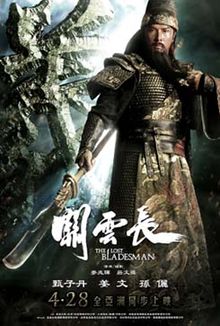
THE LOST BLADESMAN (GUAN YUN CHANG)
China, 2011, 105 minutes. Colour.
Donnie Yen, Andy On, Wen Jiang, Betty Sun.
Directed by Felix Chong and Alan Mak.
An initial piece of advice for someone who is not Chinese or who is not familiar with Chinese history: check with Wikipedia or some information site to find some detials about the central character and his place in the Chinese memory. Otherwise, the film might just be another martial arts period epic.
Actually, it is something of just another martial arts period epic. Other films have visited this era with more spectacle and panache (The Three Kingdoms, Red Cliffs). There is the expected costume, decor and production design. There are battles and special effects. There is a great deal of swordplay (not exactly play since the encounters are matters of life and death), designed and choreographed by the star, Donnie Yen.
But, Guan yun chang, the lost bladesman, is a central character in the history of these times. He has been remembered and the sources tell us that he has been revered by many as a deity. The Lost Bladesman is an opportunity to see him in his historical and military context.
The film opens with the quietly solemn ritual of his funeral. It then moves to flashback of his adult life and career as a professional soldier, coming back to his funeral at the end. The leader Cao Cao, who had tangled with, supported, and manipulated Guan, offers the key to understanding him. He says that there are wolves with lamb’s hearts and lambs with wolves’ hearts. Guan is a wolf with a lamb’s heart.
We see him in his service to several lords and the emperor who rely on him, betray him, use him. All the while, he wields his sword (and he is mighty with the sword) in loyalty to those who employ him and to accompany a woman in safety to an arranged marriage.
The film is quite episodic making it difficult to realise how many years are passing as well as to recognise where Guan stands in regard to emperor and generals and who is ordering his death and for what reasons. There is a welcome respite when Guan is wounded and spends some recuperative time in a Buddhist monastery.
For some decades now, Chinese directors, many of their world-renowned directors, have been involved in this re-visiting of history, kingdoms, wars and dynasties – which means that Western audiences can be overwhelmed by them.
1. Audience knowledge of Chinese history? The film presupposing such knowledge? Guan as a Chinese hero, revered as a deity? The impact of this film for Chinese audiences? World audiences?
2. Chinese period dramas, the sets, décor, costumes, weapons? The crowd sequences? The soldiers, the battles and the effects?
3. Donnie Yen, his choreography of the fights, the swordfights?
4. The framework of the story, Guan and his death, lying in state, his head placed in the coffin? Cao and his words, the rituals, the solemnity?
5. China and its history of civil wars? The range of leaders? The role of the emperor, his youth, being callow, vengeful? Cao and his work in the fields, with the emperor, loyalty? The nobles around him? The factions? Cao and his manipulation? The range of battles and their consequences? The years passing, war and peace? The effect of war on the soldiers, their loyalty? On ordinary people, poverty and hunger?
6. Guan and his character, his experiences in war, his skill as a warrior, his sword skills? Exercising these? The story of his loyalties, his being used by the leaders? The range of episodes, the range of battles?
7. Cao’s comment about wolves’ appearance and lambs’ hearts – and vice versa? His estimation of Guan as a wolf in appearance with a lamb’s heart? His final words about himself?
8. The various alliances, Guan and the encounter with Qi Lan? With her family? Her being promised to Yu? The journey, Cao and his permission for Guan to travel? The counter-commands of the nobles? The range of hostility that he found on the way? His friends, the craftsmen, their loyalty to the emperor? Not allowing him to pass? The false information about his deadliness? His fighting with his friends, their regrets, deaths? The abandoned city? The leader and his guarding it? The reluctance to fight, his death? The reaction of the people and their wanting vengeance on Guan?
9. Cao, his power over the years? Working in the fields with his men? His holding court? His challenging his nobles about their decisions?
10. Qi Lan, her travelling with Guan, her reliance on him, her love for him, not wanting to marry You? The attack on him, her death?
11. The years passing, Guan and his loyalties? In the battles – and the conspiracies against him? The humiliation of his death?
12. The return to the opening sequence, the tributes to Guan? Audience response to him having seen him in action, seen his character? His influence on Chinese history? His being revered by later generations as a deity?